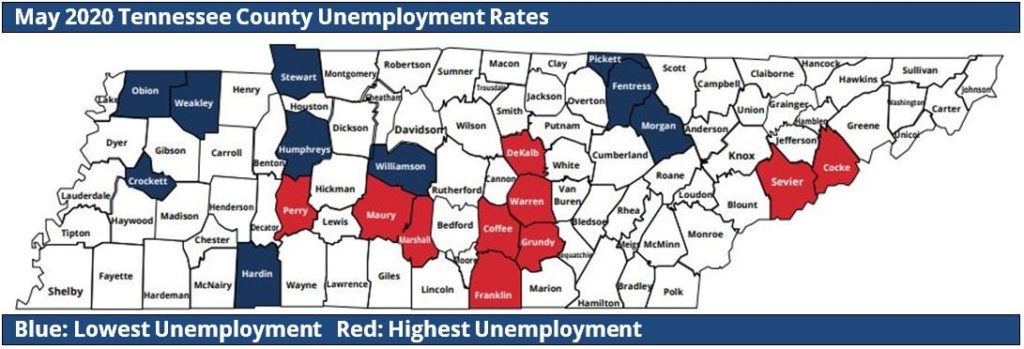Governor Bill Lee today signed Executive Order No. 50 to extend the State of Emergency related to the ongoing COVID-19 pandemic to August 29, 2020. The order allows the continued suspension of various laws and regulations and other measures in these orders to facilitate the treatment and containment of COVID-19 through regulatory flexibility, promoting social distancing and avoidance of large gatherings, and protecting vulnerable populations.
Gov. Lee also signed Executive Order Nos. 51 and 52, which extend provisions that allow for electronic government meetings subject to transparency safeguards and remote notarization and witnessing of documents, respectively, to August 29, 2020.
Executive Order No. 50
Executive Order No. 50 extends previous provisions that:
- Urge Tennesseans to continue limiting activity and staying home where possible, as well as following health guidelines and maintaining social distancing;
- Urge persons to wear a cloth face covering in places where in close proximity to others;
- Urge employers to allow or require remote work/telework if possible;
- Provide that persons with COVID-19 or COVID-19 symptoms are required to stay at home, and that employers may not require or allow employees with COVID-19 to work;
- Limit social and recreational gatherings of 50 or more persons, unless adequate social distancing can be maintained (the 6 counties with locally run county health departments may issue different directives on gatherings)
- This does not apply to places of worship, for which there are guidelines for safe operation of worship services and gatherings, though places of worship are urged to continue virtual or online services where possible;
- This does not apply to weddings, funerals, and related events, but encourages postponement of large-gathering components of such events;
- Limit contact sports with a requirement or substantial likelihood of routine close contact
- This does not apply to collegiate or professional sports conducted under the rules or guidelines of their respective governing bodies and does not prohibit training or otherwise practicing the elements of such sports that do not involve close contact with persons;
- Limit nursing home and long-term-care facility visitation, while providing a framework for safe, limited visitation set forth in Executive Order No. 49, and continue the closure of senior centers;
- Provide that employers and businesses are expected to comply with the Governor’s Economic Recovery Group Guidelines (e.g., Tennessee Pledge) for operating safely, as well as general health guidelines from the CDC and other government entities (the 6 counties with locally run county health departments have authority to issue different directives on businesses/venues);
- Provide that bars may only serve customers seated at appropriately spaced tables and must follow the Economic Recovery Group Guidelines (e.g., Tennessee Pledge) for restaurants (the 6 counties with locally run county health departments have authority to issue different directives on businesses/venues);
- Urge persons and businesses to take special care to protect vulnerable populations, including by offering delivery or special shopping hours where possible;
- Allow take-out and delivery alcohol sales by restaurants and limited-service restaurants to continue to encourage customers to utilize take-out or delivery options;
- Allow broad access to telehealth services;
- Increase opportunities for people to easily join the healthcare workforce;
- Provide easier access to unemployment benefits;
- Ensure supply chain protections;
- Extend deadlines and suspend certain in-person continuing education or inspection requirements to avoid unnecessary person-to-person contact; and
- Increase opportunities to work remotely where appropriate.
A more complete list of measures extended beyond June 30 to promote regulatory flexibility, facilitate social distancing and avoidance of large gatherings, and support supply chains and health care providers includes:
- Health care licenses, certificates, and registrations are extended until August 31, 2020, and the number of health care professionals and facilities that are eligible for an extension is increased.
- Degree holders in science fields can work as laboratory personnel under supervision. Allows more qualified graduates to work in medical laboratories.
- Testing for COVID-19 can occur at more medical laboratory facilities. Allows for more widespread testing related to COVID-19.
- Driver licenses and photo ID renewal deadlines are further extended. CDL license types remain extended until June 30, 2020; other types are extended until November 15, 2020. More people qualify for an extension.
- Deadlines for payments to reinstate driver licenses are further extended. More people qualify for an extension.
- Enhanced handgun carry permits are further extended through November 15, 2020. More people qualify for an extension.
- Deadlines for persons with interlock ignition devices are further suspended. More people qualify for an extension.
- Professional educational and training deadlines administered by the Department of Commerce and Insurance may be extended. The Department now has the authority to extend testing deadlines for regulated professions.
- Activation of Tennessee Emergency Management Plan.
- Out-of-state health care providers may practice in Tennessee.
- Prescriptions available in 90-day supply.
- Increased availability of home health services.
- Notarization is not required for health care applications.
- Retired medical professionals can easily reenter the health care workforce.
- Continuing education requirements are suspended to allow health care professionals to receive such education through electronic means.
- Laboratory inspections are suspended to allow for immediate COVID-19 testing.
- Health care licensing inspections and investigations are suspended to increase resources available to fight COVID-19 and to protect public health.
- Inspections of pain management clinics are suspended.
- Inspections of health care facilities are suspended.
- Inspections of medical laboratories are suspended.
- Inspections of pharmaceutical facilities are suspended.
- Inspections of veterinary facilities are suspended.
- Live human patient examinations are suspended for dentistry applicants, and the Board of Dentistry may modify licensing procedures accordingly.
- Memoranda of Understanding with the Department of Health to obtain confidential personal health information are enforceable emergency orders.
- Nursing graduates may practice under supervision without examination.
- Expanding locations for autopsies.
- Pharmacists can process prescriptions remotely.
- Each pharmacist can supervise more pharmacy technicians.
- Medical laboratory directors can monitor facilities remotely.
- Pre-license, post-degree mental or behavioral health professionals can provide telehealth services under supervision.
- Medical laboratory personnel can work remotely.
- Increased number of hospital beds available for COVID-19 patients.
- Regulations of emergency medical services are suspended to increase services.
- Temporary quarantine and isolation facilities may be constructed.
- Size and weight transportation restrictions suspended for emergency supplies.
- Transportation hours of service restrictions suspended for emergency supplies.
- Certain criteria for unemployment benefits are suspended to ensure such benefits are available to COVID 19-affected employees.
- Unemployment information from employers required more quickly to process benefits faster.
- Child care licensure and assessment requirements are suspended to facilitate continued operation of child care facilities.
- Examination cycle of financial institutions may be extended.
- Deadline for TNInvestco annual audited financial statement reports extended until July 31, 2020.
- Departments may extend deadlines to deposit state funds to protect state employees/customers.
- Deadline for ethics filings is extended until July 15, 2020.
- Deadlines for law enforcement training are extended.
- Free copies of business entity filings available for those using them to seek state or federal disaster relief.
- Board of Parole may modify procedures to protect public health.
- Suspends temporary application of safety valve provisions resulting from the temporary decrease in TDOC prisoners.
- Governor has discretion to utilize National Guard members in connection with TDOC operations if needed.
- Motor vehicle dealers can record liens with the Secretary of State.
- Administration of driving tests is suspended.
- Issuance of REAL-ID is suspended.
- Tennessee Corrections Institute transfer procedures are adjusted to respond to COVID-19.
- Tennessee Corrections Institute may flexibly respond to COVID-19 issues.
- Deadlines for building code and building plan inspections may be extended.
- Notarization requirements for bonds and certain legal documents are suspended.
- Deadline for firefighters to complete training may be extended.
- Deadline for law enforcement and firefighter physical examinations is extended until October 1, 2020.
- Deadline for peace officers to complete training may be suspended.
- Annual meeting of the Tennessee Judicial Conference is suspended.
- Time periods for completing securities registration requirements may be extended.
- Remote shareholder meetings permitted under certain conditions.
- Discretionary leave available for state employees affected by COVID-19.
- Inspections of mental health and substance abuse facilities and services are suspended.
- Telephone assessments for involuntary commitment cases are permitted.
- TennCare policies adjusted to prevent coverage disruptions.
- Limitations on emergency admissions to Department of Intellectual and Developmental Disabilities facilities are suspended.
- Medication administration certificates may be extended for Department of Intellectual and Developmental Disabilities personnel.
- Suspending requirements not feasible during COVID-19 pandemic to maintain service levels for persons supported by Department of Intellectual and Developmental Disabilities.
- Health insurance carriers encouraged to take steps necessary to maximize access to COVID-19 treatment, screening, and testing.
- Telemedicine access is expanded.
- All licensed health care providers can practice telemedicine.
- Tennessee Bureau of Investigation may conduct name-based background checks.
- Deadline to remove expunged records is suspended.
Executive Order No. 51
Executive Order No. 16, as previously extended by Executive Order No. 34, which allows governing bodies to meet electronically regarding essential business as long as they provide electronic access to the public and meet the safeguards established in that order to ensure openness and transparency, is extended through August 29 to ensure that governmental entities are able to carry out essential business in a safe, transparent way without creating large gatherings in a confined space and endangering persons, particularly those at increased risk of suffering severe illness from COVID-19, while determinations of how best to return to safe, in-person governmental meetings remain ongoing.
Summary of Executive Order No. 52
Executive Order No. 26, as previously extended by Executive Order No. 37, which allows for remote notarization and witnessing of documents, subject to compliance with certain procedures, is extended through August 29 to ensure that persons, and particularly populations especially vulnerable to COVID-19, including older adults and persons with compromised immune systems or serious chronic medical conditions, can continue to engage in commerce and execute legal documents without requiring in-person contact.






